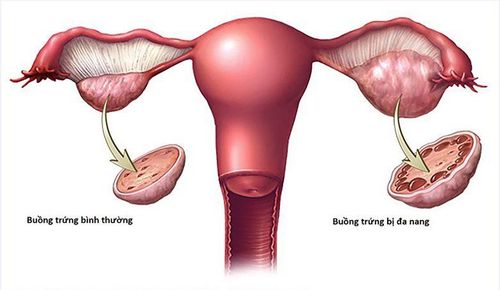This is an automatically translated article.
The luteal phase is very important for conception. Luteal support drugs are indicated if the luteal phase is defective, to prevent the risk of difficulty getting pregnant or miscarriage.1. What is the luteal phase?
The luteal phase, also known as the post-ovulatory phase, is the period of time that occurs after ovulation but before the first day of the next menstrual cycle. Normally, this phase lasts an average of 10-14 days.Some women with fertility problems have a shorter luteal phase than usual. In addition, multiple miscarriages (miscarriage of 2 or more or more in a row) is also associated with an abnormally short post-ovulatory period. Problems with this stage are sometimes called a defective luteal phase.
Trắc nghiệm: Bạn có biết nên khám thai lần đầu vào lúc nào không?
Việc khám thai lần đầu mang ý nghĩa rất quan trọng, giúp bạn xác định chính xác mình có mang thai hay không? Thai nhi đã vào buồng tử cung hay chưa?... Vì vậy, nếu chưa biết khám thai lần đầu vào lúc nào, trả lời nhanh 5 câu hỏi trắc nghiệm sau sẽ giúp bạn có câu trả lời.2. The role of the luteal phase
The menstrual cycle can be divided into two main phases: the follicular phase (or follicular phase) and the luteal phase. The ovarian follicular development phase involves the process of stimulating hormone changes in the ovarian follicle until the egg matures and ovulation occurs. After ovulation, the follicle releases the egg and becomes the corpus luteum. The corpus luteum secretes the hormones estrogen and progesterone.Both of these hormones are very important, but progesterone is the hormone that plays the most essential role in the luteal phase because of the following effects:
Inhibits the hormones GnRH, FSH and LH: These are the hormones that cause the luteal phase. stimulates the ovaries and leads to ovulation. Without this effect, the woman would be at risk of conceiving again after she became pregnant; Activate the endometrium to secrete special proteins that help nourish the embryo; Prevents Menstruation: Progesterone prevents endometrial cells from breaking down (which causes periods). This phenomenon, if it occurs, can lead to miscarriage for pregnant women. Progesterone also raises body temperature. Therefore, after ovulation, if you become pregnant, your body temperature will be higher than during the luteal phase. If you're not pregnant, your body temperature will begin to drop right before your period.
Progesterone is also responsible for symptoms that occur during the luteal phase, which can easily be confused with early signs of pregnancy.

Progesterone cũng chịu trách nhiệm về các triệu chứng xảy ra trong giai đoạn hoàng thể
3. What is the normal luteal phase?
On average, the normal luteal phase will last 12 to 14 days. However, it can be shorter - only about 8 days, or longer - up to 16 days. For example, if a woman has a normal luteal phase of 12 days, it should theoretically occur between days 11 and 13 of her menstrual cycle. If this period lasts more than 13 days, it could be an early sign of pregnancy.If the post-ovulatory period is shorter than 8 or 10 days, it is most likely a sign of a fertility problem, but sometimes this is not so obvious. Women can completely determine the length of the luteal phase from the chart of their basal body temperature from day to day.
Accordingly, if you find that your luteal phase is quite short but there are no other signs of infertility, don't worry too much. However, if you can't get pregnant after a year of trying to conceive (or after 6 months for women 35 and older), see your doctor for proper examination, advice and treatment.
4. What is the luteal phase defect?
A defective luteal phase is responsible for female infertility and repeated miscarriages due to low or insufficient progesterone levels. This condition may require luteal support drugs. Symptoms or signs potentially related to this condition include:Small spotting of blood between ovulation and the menstrual cycle; Repeated early miscarriages; Abnormal ovulation; Short menstrual cycle. A defective luteal phase can occur if the ovaries do not release enough progesterone. This condition is associated with a variety of health problems, including:
Obesity; Anorexia; Endometriosis ; Too intense exercise; Polycystic ovary syndrome; Thyroid disorders.
5. How to support the corpus luteum

Bổ sung hCG với liều lượng thấp có thể được cân nhắc sử dụng trong để hỗ trợ giai đoạn hoàng thể
Prioritize the treatment of the underlying conditions: If you have an imbalance of your thyroid gland, you should treat this condition first; Increase ovulation with luteal support drugs: By promoting ovulation, the luteal phase can take place normally; Progesterone supplementation: Although this measure is controversial, it is still undeniable that the effect of progesterone supplementation in improving fertility and limiting early miscarriage; Injected hCG (an important hormone, secreted only during pregnancy): Low-dose hCG supplementation may be considered for luteal phase support. The appointment of luteal support drugs during pregnancy of the mother will depend on the clinical development and fetal development. During the routine antenatal checkup, the doctor will decide when to stop the drug depending on the progress of the pregnancy. If the pregnancy is going well, there is no risk of miscarriage or other abnormalities, the appointment of luteal support drugs is not necessary to avoid unwanted side effects.
Please dial HOTLINE for more information or register for an appointment HERE. Download MyVinmec app to make appointments faster and to manage your bookings easily.













